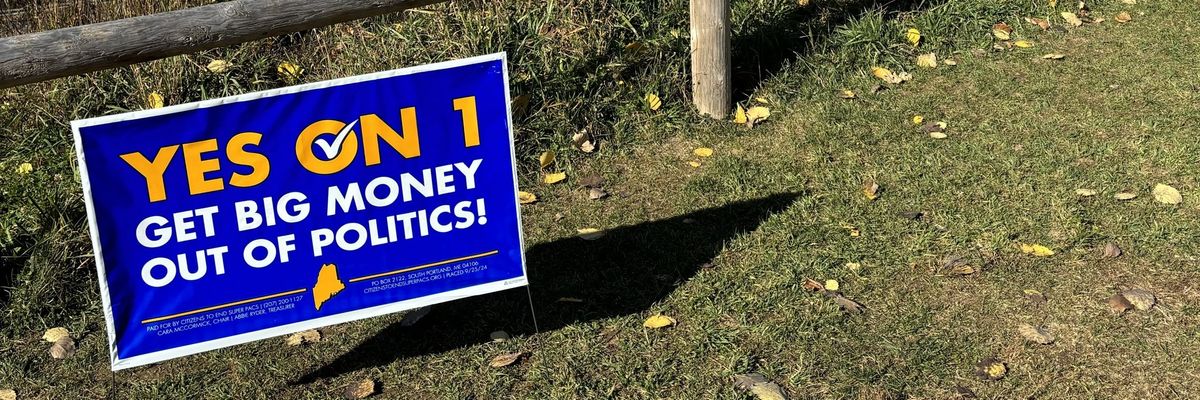As billionaire-backed Republicans dominated U.S. elections on Tuesday, voters in Maine—among the top 10 states in terms of smallest populations—overwhelmingly approved a ballot measure to limit political spending, an initiative that could reach the country's top court.
Maine Question 1 targets super political action committees (PACs), dark money groups that, for the most part, are barred from directly contributing to or coordinating with a candidate but can raise and spend unlimited amounts of funds.
Question 1 asked Mainers, "Do you want to set a $5,000 limit for giving to political action committees that spend money independently to support or defeat candidates for office?"
WMTWreported earlier this year that "the $5,000 contributions cap would only apply to state races, not United States House or Senate races."
As of Wednesday afternoon, the measure had passed 531,573 to 186,707, or 74% to 26%, with 89% of the estimated vote reported, according toThe New York Times.
"When the Supreme Court affirms what Maine voters have done, it could end super PACs everywhere."
"We're grateful to the Maine people for once again leading the way to help fix our broken political system," said Cara McCormick, chair of Maine Citizens to End Super PACs, which collected signatures to get the citizen-initiated measure on the ballot.
"The Maine people deserve a system that is not only free from corruption, but also free from the appearance of corruption," McCormick added. "Our greatest hope is to restore people's faith in our democracy and increase participation across the board."
The campaign highlighted that "some of America's leading constitutional law experts—Laurence Tribe, Lawrence Lessig, Neal Katyal, Al Alschuler, and others—have argued that Question 1 is the most immediate pathway to ending super PACs, the biggest source of dark money in elections."
Welcoming the measure's passage, Lessig declared Wednesday that "this is a great gift from Maine to democracy in America."
"We expect this initiative will be challenged," he explained. "But when the Supreme Court affirms what Maine voters have done, it could end super PACs everywhere."
As Maine Morning Stardetailed Wednesday:
Since Buckley v. Valeo in 1976, the Supreme Court has allowed contributions to be regulated when there is a risk of "quid pro quo" corruption, essentially a favor for a favor. In the case of elections, if there is a risk someone could be making a donation to a candidate in exchange for a favor, only then can Congress regulate that contribution. In 2010, the Supreme Court extended this reasoning to corporations and unions in Citizens United v. Federal Election Campaign Act.
Three months later, in SpeechNow.org v. FEC, the U.S. Court of Appeals for the District of Columbia Circuit upheld that contributions to groups making independent expenditures can't corrupt or create the appearance of corruption. That decision essentially created the "super PAC," which can receive unlimited contributions but can’t contribute directly to candidates. Other lower federal and state courts followed suit, and the ruling was never reviewed by the Supreme Court.
The editorial boards of both the Bangor Daily News and Portland Press Herald backed the ballot measure, with the latter writing last month that "ours would be the first state in the nation since the Supreme Court's Citizens United ruling in 2010 to move to limit contributions to PACs that can make independent expenditures."
"We believe that political spending has spiraled out of control, in many cases, and that the absence of any limit on PACs is inappropriate and leaves America's system of campaigning and voting vulnerable to the whims of bad actors," the board argued. "If Maine can play a leading role in bringing some order and fairness to political spending nationally, we should seize the chance."
